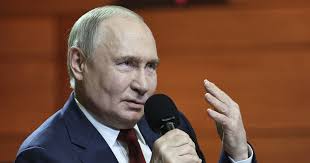Trump says Putin is ‘playing with fire’ as Russia makes gains in Ukraine

Former U.S. President Donald Trump has issued a stark warning to Russian President Vladimir Putin, saying the Kremlin leader is “playing with fire” as Russian forces have recently made notable territorial gains in Ukraine. This comes at a time when the conflict, now over a year old, continues to shake the geopolitical landscape and provoke global concern over stability in Eastern Europe.
Russia’s Military Progress and Its Significance
In recent weeks, Russian troops have advanced steadily in the eastern parts of Ukraine, especially within the contested Donetsk and Luhansk regions. These areas have been the epicenter of fierce battles between Ukrainian defenders and Russian-backed separatists since the conflict intensified in early 2022. The recent push has allowed Russia to consolidate its control over strategic territories, raising alarms about a potential long-term occupation.
While Moscow frames its operations as “special military actions” aimed at protecting Russian-speaking populations, Ukraine and the majority of the international community regard this as an unprovoked invasion threatening the sovereignty and territorial integrity of Ukraine.
Russia’s gains, although costly in terms of manpower and resources, represent a strategic effort to strengthen its hold on eastern Ukraine and create a land corridor connecting Crimea to mainland Russia. Analysts warn this could complicate future peace negotiations and prolong the conflict.
Trump’s Warning: “Playing With Fire”
Against this backdrop, Donald Trump’s recent comments carry weight. In interviews and public statements, Trump expressed his belief that Putin’s aggressive campaign is reckless and could backfire badly. “He is playing with fire,” Trump said, suggesting that continued military escalation might provoke unintended consequences, including harsher international backlash or even direct confrontation with NATO forces.
Trump’s stance marks a notable shift from his earlier rhetoric during his presidency, when he was often criticized for appearing overly conciliatory toward Putin. Now, as Russia’s campaign in Ukraine endures with growing international sanctions and condemnation, Trump’s cautionary tone reflects broader concerns about the risks involved.
He emphasized that while Putin may believe he can achieve his objectives quickly, the costs—both militarily and diplomatically—could be severe. Trump warned that miscalculations in Ukraine could trigger a wider conflict, destabilize global markets, and increase energy insecurity, especially in Europe.
The International Community’s Response
The global reaction to Russia’s recent advances has been firm and consistent. Western countries, led by the United States and European Union, have condemned the incursions and pledged continued support to Ukraine. This support includes providing military aid, humanitarian assistance, and imposing sweeping sanctions aimed at crippling Russia’s economy.
Sanctions target critical sectors such as energy exports, finance, technology, and individuals close to Putin’s inner circle. The goal is to pressure Moscow into halting its military operations and returning to diplomatic negotiations. Despite these measures, Russia has doubled down, showing resilience and a willingness to endure economic hardship to pursue its strategic aims.
NATO, meanwhile, has bolstered its defenses in Eastern Europe, reassuring member states near the conflict zone and signaling that any direct attack on its members would trigger a collective response. The alliance’s support for Ukraine, short of direct military intervention, remains a delicate balancing act aimed at deterring Russian aggression without sparking a wider war.
The Human Cost and Regional Impact
Beyond geopolitical maneuvers, the conflict in Ukraine continues to exact a devastating toll on civilians. Thousands of lives have been lost, and millions have been displaced. Cities in eastern Ukraine have suffered extensive damage, with critical infrastructure destroyed.
Humanitarian organizations warn that the ongoing fighting threatens to exacerbate an already dire situation. Access to food, medical care, and shelter remains precarious for many, especially as winter approaches. The international community is increasingly calling for ceasefires and humanitarian corridors to alleviate civilian suffering.
The regional impact also extends to neighboring countries, many of which have taken in refugees fleeing the violence. Economically, the conflict has disrupted supply chains, particularly in energy and grain exports, leading to inflation and shortages that ripple far beyond Ukraine’s borders.
What Lies Ahead?
Looking forward, the situation remains highly uncertain. Russia’s tactical gains could embolden Putin to press further, while Ukraine’s resilience and Western support make any quick victory unlikely. The risk of prolonged conflict raises fears of a frozen war or intermittent escalations that could drag on for years.
Diplomatic efforts continue behind the scenes, but trust between the parties is thin. The international community faces the challenge of balancing pressure on Moscow with incentives for negotiation, all while avoiding escalation that could spiral into direct conflict between nuclear powers.
Experts warn that Putin’s “playing with fire” could have unintended consequences, including internal dissent within Russia or greater isolation on the world stage. Meanwhile, Ukraine’s struggle for sovereignty has galvanized global support for democratic principles and resistance to aggression.
Conclusion
Donald Trump’s warning to Vladimir Putin that he is “playing with fire” highlights the dangerous stakes of the Ukraine conflict as Russia makes gains on the battlefield. The situation is a test of global diplomacy, military strategy, and humanitarian resolve. With lives at risk and the geopolitical order at stake, the world watches closely, hoping for a resolution that restores peace and stability to the region.






